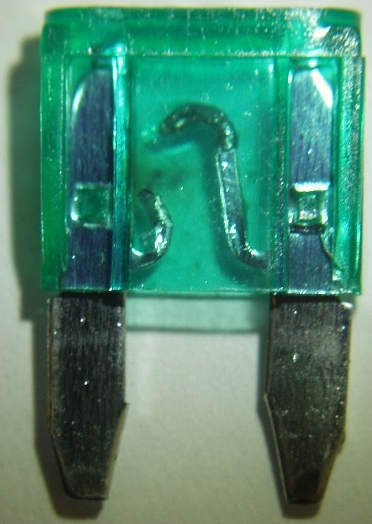I was out "walking the dog" yesterday and I decided to use my bike with the MPII for a change instead of the one equipped with the Smart Pie.
I was just beginning to enjoy popping a few wheelies again with the extra torque, but as I started to accelerate up a steep part of the field the motor suddenly cut out completely, causing the bike to come to an abrupt standstill.
I initially thought the controller must have failed
(assuming this was the reason for the strong braking effect) as the bike seemed so very difficult to pedal, but when I raised the wheel off the ground and spun the pedals, it turned very easily.
Then I noticed there were no lights on the throttle and instantly realised what must have happened - and sure enough, the fuse in my battery pack had blown:

After riding to the top of the field under my own steam
(using a very low gear) it quickly became apparent that riding a bike up a steep grassy field is a whole lot harder
(and much slower) when you have to supply
all the motive power yourself.
It soon became apparent that my poor old legs were completely out of condition as they had not been subjected to that amount of physical punishment for quite a while.
So why did the fuse blow?
Well, the small 8 cell LiPo pack I was using was built specifically for use with my Smart Pie and was therefore protected with a 30 Amp fuse. I had quickly fitted this lightweight battery pack to the other bike without even giving it a second thought, but I had failed to take into consideration the modified shunt on the MPII's controller which allows it to draw more than 45 Amps from the battery under load, so the poor little 30 Amp fuse didn't really stand much of a chance.
Fortunately for me, everything started working perfectly again after I fitted a new 30 Amp fuse, but I think I'm going to uprate the fuse rating on this pack
(by adding another 30 Amp fuse in parallel with the existing one) so I can use the small lightweight battery pack on my MPII without any more unexpected failures.
 Alan
Alan